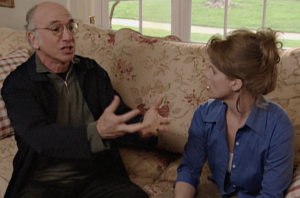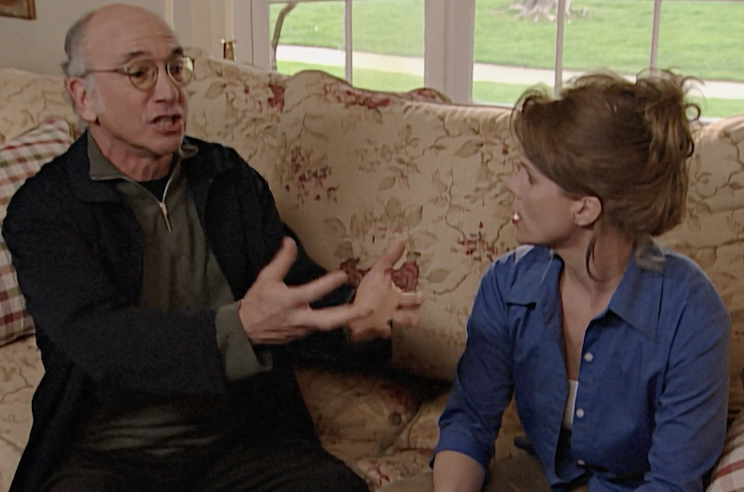In Curb Your Enthusiasm, Larry David’s problems are often measured in piles of money, or manifested in ways that they can only manifest for the comically rich. But the motives and dilemmas behind these problems are by equal turns petty, banal, and relatable. When Larry checks out of his Manhattan hotel on an HBO-sponsored trip, the receptionist presents him with a sheet of additional room charges. Larry tries to quickly sign it off, but the eyes of Jeff, his manager, are quicker. “You don’t need to worry,” he proclaims loudly. “HBO will pay for the porn!” The following exchange escalates in what would become a near-infallible model of dialogue for Curb, until finally Larry cuts the tortured proceedings off with a sharply-edged “SHUT UP!” Larry David, in the end, will pay for his own porn.
The hotel check-out scene, part of a pilot documentary that formed the basis of Curb, was filmed in 1999. This was a time when children could visit the cockpit of a plane before takeoff, people had to flip open their phones to make calls, and high-definition filmmaking technology did not yet exist. We observe Larry’s troubles through the grainy lens of old Nikons. And it works — the home-video quality reflects the nature of Larry David’s fictionalized life, plagued by everyday sentiments like self-consciousness, obsessive-compulsive disorder, and petty debts between frenemies. Other films from the era and earlier with more sophisticated effects, suitable for massive battles or supernatural landscapes, indicate that Curb’s lag might be deliberate.
The same choice — or limitation — also works for Da Ali G Show and Borat: Cultural Leanings of America for Make Benefit Glorious Nation of Kazakhstan, two tightly linked creations of the chameleonic Sacha Baron Cohen. While Larry David still wanders around the periphery of possibility, lily-white hoodophile Ali G and his two correspondents, the brashly incompetent Kazakh journalist Borat and the hyper-sexual, hyper-gay Austrian fashion reporter Brüno, bend reality with daringly indecent stunts. But reality, while bent, is rarely broken — their unfortunate interviewees are often too polite, too nervous, or too gullible to expose the troika (who never appear in the same room) as avatars of a single comedian. The humor is keenly felt and irreverent to the bone, and it feels suitable to use camerawork that is as shoddy as the content is obscene. And in some cases, there is an implied in-universe explanation — Borat’s Kazakhstan is a woefully underdeveloped country that could hardly afford more than 20 jars of gypsy tears, let alone HD camera technology. It wouldn’t make sense for Borat to film his state-sponsored documentary with anything better than a grainy old Nikon.

Curb and Borat have both lived a blessed lifespan — the former for 24 years and the latter for 20, beginning as a correspondent for Ali G and presumably ending with Borat Subsequent Moviefilm: Delivery of Prodigious Bribe to American Regime to Make Benefit Once Glorious Nation of Kazakhstan. For its part, Curb is having its curtain call this year with a final season — its thirteenth. But with longevity came exposure to new filmmaking technology that smoothed the uneven contours of 1990s and 2000s camerawork for high-definition glory. The visual impact is certainly different now, but that’s not all of it. I feel like I’m watching a script played out on the screen, carefully curated by expert direction, rather than witnessing something natural and spontaneous occur from just a few steps away or captured by the phone camera at hand. Rough jokes clash with smooth shooting; shiny backdrop competes with dialogue for attention. And the loss of intimacy can be especially fatal for some sequences in Borat, where the reactions from hapless subjects and bystanders are genuine.
Perhaps the directors did not think about this issue for more than a few minutes. If everyone else is using the new technology, why don’t they? Keeping up with the times seems as intuitive as adjusting the eyes to new light. But perhaps it would serve comedies like Curb and Borat well to keep the eyes closed for a while longer, and think about what made them great in the first place.








